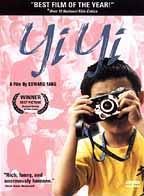FILM NOTES
FILM NOTES INDEX
NYS WRITERS INSTITUTE
HOME PAGE

(Taiwanese/Japanese, 2000, 173 minutes, color, 35mm)
Directed by Edward Yang
(In Hokkien, Mandarin (with English subtitles) and English
Starring: Nien-Jen Wu, Elaine Jin, Issey Ogata, Kelly Lee
The
following film notes were prepared for the New York State Writers
Institute by Kevin Jack Hagopian, Senior Lecturer in Media Studies
at Pennsylvania State University:
The city drama… Beautifully melodramatic tales of ordinary people in the web of teeming neighborhoods, hurrying traffic, and deeply sheltered hurts of modern life. The city drama is an omnibus of sentiment. Normal lives are disrupted by domestic tragedies that could be expressed in a single paragraph of a big-city newspaper – an announcement of a divorce, a death notice – yet they are mountainous in their impact when the family who suffers them is followed gently and closely by filmmakers who find their troubles not minor at all, but epic, the emotional stakes as high as if the salary-men and women of these films were dowager empresses or sultans. The films of Rainer Maria Fassbinder, Satyajit Ray, Kenji Mizoguchi, and penultimately, Yasujiro Ozu’s film of a family’s agony at a son’s departure, 1953’s Tokyo Story, have made the city drama the cinematic voice not merely of urban life, but of the sweet sadness of loss that only the closest families know, wherever they live.
NJ Jian and Min-Min are a settled couple, comfortable in Taipei. NJ is 45-ish, the co-owner of a computer concern. The company has made a good deal of money in the past, and NJ and Min-Min appeared headed through an uneventful middle-age.
But the city drama is a world of high emotions held in low profile. Under the veneer of stability, the substrate of NJ and Min-Min’s life begins to shift and crumble. At first the changes in their lives seem just a momentary detour form the predictable path the family is embarked on. NJ’s business starts to teeter on the brink of insolvency, and he begins a friendship with the winning but mysterious Japanese software designer, Ota. And then, on a single day, there occurs the kind of compound tragedy that always makes the city drama almost overwhelmingly sad. An ill-starred marriage is the predicate for a stroke, and the badly-timed reappearance of an old girlfriend. A chain of events breaks the heart of the family, pulling them each into the agonized solitude amid millions that only the city dweller knows. Adultery, crime, even murder issue from the seeds of alienation, and the family that had once been like the fingers of one hand is now grown cold and suspicious of one another.
What the Jians must do is simple, and yet overwhelming: they must cope. Every day in the city is about coping, of course; coping with the thousand inconveniences and intimidations of street life, but also learning to love the moments of sudden inspiration and serendipity that only the city’s vast size and its huge compass of humanity make possible. Director Edward Yang has said that coping is not simply a matter of maturing:
"I think what I’m getting at in this film is the fact that it makes no real difference whether you’re young or old; everyone copes with life as it comes, no matter what their age. The process doesn’t change. Everyone asks themselves is what they have is all here is, and wonders if they could have a second chance."
The answer to these twin conundrums, discover the characters in Yi Yi, is finally affirmative, but in a bemusing way. Yes, it turns out, this is all there is, but it is also true that everyone gets a second chance if they manufacture it for themselves out of the wreckage of their failed first chances.
Edward Yang has said that he designed NJ’s character to embody a central irony: he is the high-tech industries, which demand constant innovation, yet NJ cannot innovate in his own life. Indeed, Yang himself was forced to innovate in order to bring Yi Yi! to fruition. The Taiwan film industry has devolved, in the last several years, from an efficient, well-integrated national cinema based in Taipei to a fragmented world, virtually without infrastructure. Yang had to find his actors by calling acting workshops, training inexperienced performers, and then casting them. The results are extraordinary, particularly with Jonathan Chang and Kelly Lee, the children who play Yang-Yang and Ting-Ting, the two youngest children of NJ and Min-Min. In a dozen other ways, Yang had to make do, to get along, to struggle through. To cope, he learned, is to thrive.
— Kevin Hagopian, Penn State University
For additional information, contact the Writers Institute at 518-442-5620 or online at https://www.albany.edu/writers-inst.
 Yi Yi
Yi Yi